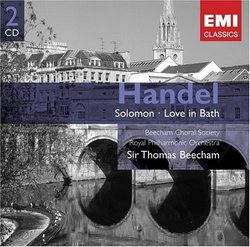| All Artists: John Cameron, Thomas Beecham, George Frederick Handel, Royal Philharmonic Orchestra, Elsie Morison, Ilse Hollweg, Lois Marshall, Alexander Young Title: Handel: Solomon; Love in Bath Members Wishing: 0 Total Copies: 0 Label: EMI Classics Release Date: 5/24/2005 Genre: Classical Styles: Opera & Classical Vocal, Historical Periods, Baroque (c.1600-1750), Modern, 20th, & 21st Century, Symphonies Number of Discs: 2 SwapaCD Credits: 2 UPC: 724358651621 |
Search - John Cameron, Thomas Beecham, George Frederick Handel :: Handel: Solomon; Love in Bath
 | John Cameron, Thomas Beecham, George Frederick Handel Handel: Solomon; Love in Bath Genre: Classical
|
Larger Image |
CD DetailsSimilar CDs |
CD ReviewsHandel according to Beecham according to Handel?! Benjamin R. Cox, III | Groveland, Fl United States | 02/24/2006 (5 out of 5 stars) "I studied at the University with Geoffrey Gilbert, the flautist with Sir Thomas Beecham and the Royal Phil. I was blest to be with Mr. Gilbert for about two and a half years, so I got a full serving of the world according to Sir Thomas. If Sir Thomas said this was Handel's intention, you believed it. If you don't accept that, listen to his recording of Messiah! Anyway, this recording is definitely how Handel was done in England in the 50's. But every phrase is caressed with love and attention and the choral singing is outstanding. The "Nightingale" chorus caresses the ear with a sweetness found in no other recording. The soloists were the outstanding Handelians of their day, and the orchestra (not to be left out) does a marvelous job! Just listen to the entrance of the Queen of Sheba. And, be ready for the cymbal crashes at the climaxes of the choruses! Handel really didn't write those, but who cares? After all, Sir Thomas always said, "The British don't much like music, but they LOVE the noise it makes". In this recording you get some glorious noise! I highly recommend this, even to the most hardened purist. Take off your purist earphones and just indulge in pure musical sweetness!" If You Love Beecham ... John Matteson | New York City, United States | 06/14/2005 (5 out of 5 stars) "You'll love his reworkings of Solomon and the various orchestral snippets from Handel operas that he wove together to create Love in Bath. But if you're interested in faithful renderings of baroque classics, original instruments, etc., steer clear. I happen to be a sucker for Beecham's instrumentation, but authentic this album emphatically is not. My advice: forget that it's Handel. Just sit back and enjoy this album for what it is, a riotous romp and the best fifties nostalgia this side of Marilyn Monroe." Treasure--or Travesty? Johannes Climacus | Beverly, Massachusetts | 02/04/2008 (5 out of 5 stars) "Here is one historic performance which I never expected to see reissued, despite Sir Thomas Beecham's eminent reputation. The reason is clear: the aesthetic priorities of our time uphold, above all else, fidelity to the composer's (presumed) intentions and to correct performance practice (as determined by contemporary musicological research). Beecham's recording of *Solomon* fails utterly on both counts, and therefore could be regarded as simply a travesty. Indeed, Beecham's rescorings and rearrangements amount to something like a wholesale recomposition. By omitting most of Act II (the central dramatic panel of the piece in which Solomon adjudicates the competing claims of the two harlots), moving about choruses and arias elsewhere, and reassigning the role of Solomon to a baritone soloist, Beecham turns Handel's original grand design into something like a pastoral serenata.
So, then, why do I love this recording so much? Why would I take it to the proverbial desert island in preference to period instrument performances of Handel's original conception, such as those by McCreesh and Gardiner (fine though they are)? The answer hinges on the difference between competent artistry and creative genius. Beecham saw possibilities in Handel's score which, as realized in the arrangement recorded here, turn a great oratorio (indeed, one of Handel's greatest) into something utterly magical. Yes, this is a recomposition, but one in which certain aspects of Handel's original--its sensuous beauty, charm, and majesty-- are given a chance to shine in ways which a more faithful reproduction of the score would render inaccessible. To cite just two instances: (i) In the Act I duet for Solomon and his queen, "Welcome as the dawn of day," by adding some extra contrapuntal detail scored for woodwind and a *sempre pizzicato* bass, Beecham manages to transform a charming if conventional dalliance into something far more human, and extraordinarily touching; (ii) in the Queen of Sheba's entrance aria, "Every sight these eyes behold," by the addition of some flute trills in the second half, Beecham turns what might be considered a formal gesture by one head of state to another into something beguilingly seductive, even a wee bit naughty (as if, having heard of Solomon's amorous exploits with his harem of wives and concubines, she has come to discover whether he in fact lives up to his reputation as a lover). Indeed, the open-minded listener will delight in many such "illuminations" of Handel's score by this natty, naughty raconteur of a conductor. Not that every number is a success. In general, Beecham does better in conveying the intimacy of the amorous music, and the charm of the pastoral scenes, than the drama and sense of spectacle inherent in the great choruses (though the concluding, "Praise the Lord with harp and tongue" is truly grand, in an Elgarian sort of way). The problem may be that the chorus itself is too large and mushy of diction; smaller groups can enunciate more clearly and articulate the rhythms more incisively. The soloists do a splendid job, however. Cameron, though somewhat dry of voice, is a magesterial Solomon; Morrison a delectably naive (though hardly chaste) consort; Marshall a ravishing Queen of Sheba who rises to astonishing eloquence in her parting aria; and Young an appropriately sententious but wonderfully mellifluous Zadok. But in the end this is Beecham's show; whatever the flaws and extravagances of his "realization", this is a *Solomon* to treasure. It is not, however, the best way to get to know the work; Handelians should first hear either McCreesh (whose version is absolutely complete) or Gardiner (regrettably pruned but incisively dramatic). Then by all means add Beecham's warmly recorded, lovingly remastered relic as a supplement if you have a taste for musicologically guilty pleasures. EMI's reissue also comes with the substantial bonus of Beecham's goregously scored ballet-pastiche, *Love in Bath.* Don't hesitate: this set is inexpensive and who knows how long it will be available?" |

 Track Listings (27) - Disc #1
Track Listings (27) - Disc #1